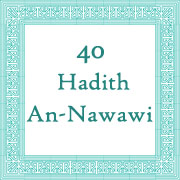
Explanation of Hadeeth Number 25
In the arabic the word used for affluent is 'duthoor' which implies a large amount of wealth. And in this hadeeth is an explanation of the Virtue of reciting tasbeeh and all of the other forms of dhikr (remembrance) of Allaah, and of ordering the good and forbidding the evil, and of ensuring that one has the intention of Pleasing Allaah even in the Mubaah (Permissible) actions, for by having such pure intentions they turn into actions of Obediance, deserving of reward.
And in this hadeeth is proof that it is permissible to ask a scholar about the evidence for some of the things in the scholar's fatwaa (legal verdict) that are not apparent to the questioner, as long as it is clear that the scholar does not dislike this and the questioning is done in a respectful fashion.
And his (sallAllaahu alayhi wa sallam) statement "And commanding the good is a charity, and forbidding an evil is a charity" is an indication that every single type of ordering the good or forbidding the evil carries the ruling of being a charity. Indeed, it is greater than the tasbeeh and the other forms of dhikr mentioned after it, because ordering the good and forbidding the evil is a Fard Kifaayah (Collective Obligation), and at times it may become obligatory upon every individual, and this is opposite to the case of the adhkaar (plural of dhikr) mentioned previously, which are only nawaafil (voluntary deeds). And the reward of performing the Obligatory deeds is much greater than that of the Voluntary deeds, as the statement of Allaah 'azza wa jall in a hadeeth Qudsee indicates : "And My slave does not come closer to Me by anything more beloved to Me than the deeds that I have Obligated upon him" [narrated by al-Bukhaaree]. Some of the 'ulamaa have said that the reward for the obligatory deeds is greater than that for the voluntary deeds by seventy levels, as is indicated by some ahaadeeth.
And as for his (sallAllaahu alayhi wa sallam) statement : "and in the bud'i (sexual act) of each one of you there is a charity" then the word "bud'i" is a general term that encompasses the meaning of intercourse and also the private parts themselves, and both of them correctly convey the intended meaning here. And it has already been mentioned that the Mubaah (Permissible) actions - ie not Obligatory nor Recommended - become like acts of Obediance, which are rewarded for, through the presence of the correct intention. So the act of intercourse also becomes an act of worship, if by it a person intends to fulfill the rights of his wife, and to live with her in a good way, or to seek a pious child, or as a protection for himself or his wife from illegal desires, or other than these from the praisewrothy purposes.
And their statement (radiAllaahu 'anhum) : "O Messenger of Allaah, when one of us fulfils his carnal desire will he have some reward for that ?" and his (sallAllaahu alayhi wa sallam) reply : "Do you not see that if he were to act upon it [his desire] in an unlawful manner then he would be deserving of punishment ?" until the end of the hadeeth, then this indicates the permissibilty of Qiyaas (using analogy to derive rulings), and this is the madhhab of the 'ulamaa, and none are opposed to this except the Dhaahiriyyah (Literalists - referring to the school of Daawood adh-Dhaahiree). And as for what has been narrated from some of the Taabi'een (the generation after the Sahaabah) and from other scholars to the effect that Qiyaas is rejected and blameworthy, then what they intended was not the Qiyaas that is known by the Mujtahid Fuqahaa (the Jurists who make ijtihaad in deriving rulings), and this is what is known as Qiyaas al-'Aks (literally, 'analogy of the opposite'), and the scholars of Usool have differed over acting upon it, but this hadeeth is a proof for those who do act upon it.
Summary :
That we should have concern for attaining the reward of Allaah
That such concern is from the characteristics of the First Generation of Muslims - the Companions
That comparing onself to another to see how many good deeds we are performing is permissible and recommended
That looking towards one who is rich so that we may do good things like him is desirable
That being rich is not a bad thing in and of itself
That everyone can perform acts of charity no matter what his station in life
That remembering Allaah with words is charity
That conjugal relations with ones wife is a charity
That one is rewarded for abstaining from the unlawful, and instead adopting a way which is lawful
http://www.islaam.net/main/display.php?id=217&category=24








 Please check our
Please check our 




 :
: 
